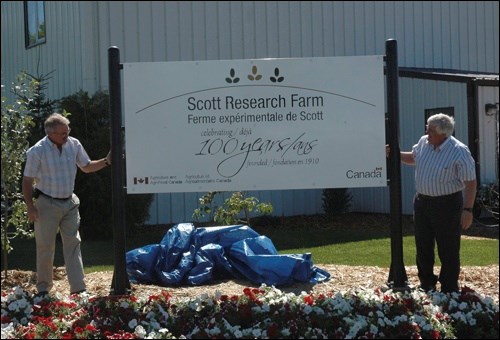It was an extra special day for the Scott Research Farm Friday.
Not only was it celebrating its 100th anniversary of agricultural research in Saskatchewan, but mustard seed producers received a boost from the federal government.
Agriculture minister Gerry Ritz announced $4 million in funding to develop new varieties of mustard seed and also develop new market opportunities for farmers. The investment comes from the Agri-Innovations program and will go to Mustard 21 Canada, which will develop the seed.
Ritz said the funding will help unlock the potential of mustard seed. Research would encourage the potential use of mustard products as a natural preservative, as a biopesticide for pest control in turf and ornamental plants and as an industrial feedstock for high-value applications such as biodiesel additives or biolubricants.
"It'll benefit ultimately the primary producers of mustard," Ritz said of the funding. "There's a growing appetite for mustard products. We're broadening it beyond the great yellow substance you put on your hot dog and hamburgers, into a lot of pesticide bases and so forth, and some of that work is being done already. It's now time to take it to field trials and move forward with some new genetics."
Ritz said they are hoping to duplicate the similar success they had with canola, noting mustard is a derivative of canola. He said about $300,000 of the funding to Mustard 21 will be invested right at the Scott Research Farm.
The funding news capped a celebratory atmosphere at the Scott Research Farm, which was celebrating its centennial on the same weekend the neighbouring village of Scott was celebrating their 100th anniversary.
Dignitaries on hand for the ceremonies included Mayor Eric Schell from Scott as well as Bill Boyd, provincial energy minister.
"We're a small community of 80 people and it's still our only employer," said Schell, noting the importance of the research farm to the small community. He was grateful some of the Mustard 21 funding would go to the research farm to help maintain it in the community.
"It's a very special occasion for the town of Scott," said Boyd. "The research station has played a very instrumental role in agriculture, changing agriculture from subsistence to a profitable enterprise now that many people make a living at."
Boyd said the Scott Research Farm has created jobs in the area and in agricultural research, and has created wealth in rural Saskatchewan.
Also on hand for the event were the employees and summer students of the Scott Research Farm as well as numerous guests and onlookers, many of whom stayed to watch the seeding demonstrations, as well as attend the tours and exhibits available during the day.
The exhibits were part of the Scott field day that has been held on an annual basis at the facility since 1980.
The displays showed off the history of wild oat control, the minor use of pesticides, the evolution of canola, historical wheat varieties, long-term crop rotations, developments in dandelion control and other innovations. It was a chance for people to see what was happening at the facility now, as well as take a look at how farming was done years ago.
The research farm started out as one of six new experimental farm stations designed to serve Canadian farmers.
Eric Johnson, agrologist in charge of the Scott Research Farm, said the facility plays an important role in research and has changed over the 100 years it has been in operation.
"We had livestock here, we had cattle herds, we had hogs, we had poultry," said Johnson. "Horticulture was very big. As time went on, though, the livestock was phased out and moved in to mainly crop programs."
All of the work right now is on annual and perennial crops, Johnson said.
Current research innovations include an alternative cropping study that has been going on for 16 years, the second-longest term cropping study going on in Canada. Johnson said the study looks at different environmental and economic information on a variety of cropping systems over time. A number of other projects are on the go as well. Johnson estimates there are about 200 experiments happening at the farm at the moment.
He said the Scott community has been supportive and the Scott Research Farm has been a driver of economic activity for the area.
"We both need each other," Johnson said, saying they get a lot of help and support from the town as well.




